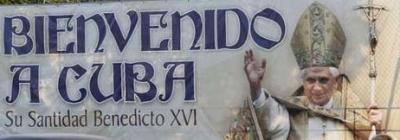Crackdown on dissidents mars Pope Cuba trip

By SOPHIE INGE
ROME –- As many as 150 Cuban dissidents are believed to have been arrested by authorities prior to Pope Benedict XVI’s official trip to Cuba as part of his visit to Latin America.
The arrests were believed to have been carried out to prevent demonstrations by regime opponents on the eve of a planned meeting between the pontiff and former Cuban President Fidel Castro. “I decided to request a few minutes of his very precious time when I heard from our Chancellor Bruno Rodriguez that he would grace us with this humble and sincere visit,” said the ex “Lider Maximo” in a written statement.
“On Wednesday, I will greet Pope Benedict XVI with great pleasure as I did with John Paul II,” he added.
The pontiff arrived at Santiago de Cuba airport from Mexico on Monday afternoon, where he was greeted by Raul Castro, President of Cuba - with whom he had a private 55 minute private meeting on Tuesday - as well as Archbishop Dionisio Guillermo Garcia Ibanez, President of the Cuban Episcopal Conference and Cardinal Jaime Ortega y Alamino, Archbishop of Havana.
Despite assurances made to President Castro of the non-political nature of his visit, controversy has been sparked following a request made from a group of Cuban human rights activists called ‘Damas de Blanco’ to papal nuncio Monsignore Bruno Musarò for a meeting with the pontiff in an attempt to rally support. ‘Damas de Blanco’, a group which campaigns for the release of political prisoners and prisoners of conscience is so-called because of the white clothing worn by the wives, mothers and children of the prisoners within the Havana parish of Santa Rita. Although many prisoners have been released, they have continued to protest.
“It is not true that we are agents of imperialist forces,” Italian daily Il Messaggero quoted the group as saying. “We want the pontiff to observe the life that Cubans lead. It’s hard.”
The group complained of an escalation of repressive action over the last few days and as many as 70 arrests.
“We implore His Holiness,” said Berta Soler, a 48-year-old ‘Damas de Blanco’ activist, “for a few minutes of his time. We know that his diary is full and we do not want to create problems, but we wish to tell him of another reality. Unfortunately, human rights are not respected here.”
There have also been controversial reports of the removal of around 100 beggars and homeless people from Havana to a shelter called “The Colony,” described by critics as “a type of ghetto” in preparation for the pontiff’s visit.
During his visit, the pontiff called for an “ethics that puts human beings at the centre.” He spoke of the importance of the family, which has been linked to proposals in the Cuban parliament to change laws concerning homosexual couples. “The rebirth of society demands upright men and women of firm moral convictions,” the pope said, “with deep values who will not be manipulated by dubious interests and who are respectful of the unchanging and transcendent nature of the human person.”
Benedict also made reference to the economic crisis, commenting that many people see it “as part of a profound spiritual and moral crisis which has left humanity devoid of values and defenceless before the ambition and selfishness of certain powers which take little account of the true good of individuals and families.”
Despite Cuba being a traditionally atheist state, an estimated 60 per cent of Cubans consider themselves to be Catholic. In a press release from the Dignitatis Humanae Institute, Cardinal Renato Raffaele Martino expressed hope for a development in relations between the Church and the State: "The recent steps in Cuba towards further religious liberty are to be encouraged and we are now seeing a cautious optimism growing amongst the Christian community. Following the positive response to the Pope's visit, the Cuban government now has a unique opportunity to demonstrate that they are genuinely dedicated to improving religious freedom for all Cubans."


